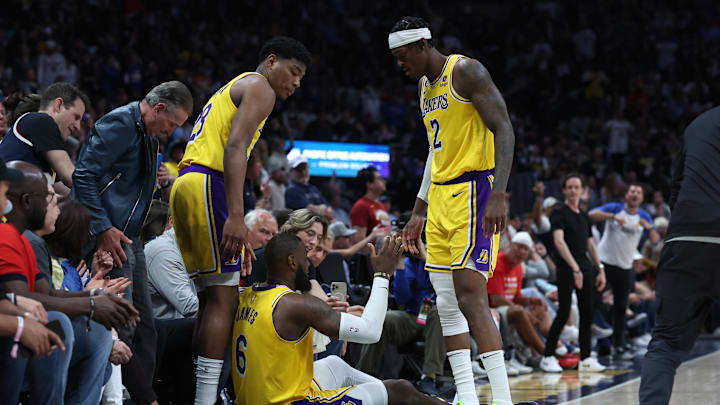The Los Angeles Lakers will enter the 2024-25 season with two of the top 10 players in the NBA. No matter what else is said about the Lakers, including the context of how last season played out, it's an inescapable fact that gives the purple and gold an outside shot at winning a championship.
The question, of course, is whether or not the supporting cast will step up, stay healthy, and help Los Angeles make its second deep playoff run in three years.
Many positions on the Lakers' roster seem generally resolved as far as the structure of the rotation is concerned. Davis and James will start in the frontcourt, Austin Reaves is locked in at shooting guard, and D'Angelo Russell will start at point guard until Los Angeles actually confirms the trade rumors.
The position at which uncertainty reigns supreme, however, is the forward spot opposite James—where two viable options have emerged.
The arguments for Rui Hachimura and Jarred Vanderbilt to start at forward are remarkably strong. Both have impacted winning in a positive manner when given considerable playing time, and each provide a drastically different skill set to provide a unique brand of value.
The question is: Which player has the stronger case to be the starting small forward in 2024-25—and is there a third option to consider?
The case for Rui Hachimura
This past season, Hachimura unfortunately became one of the most criminally underutilized players in the NBA. Despite the fact that he played better when he received more playing time, and the team followed suit, he spent 29 games on the bench and averaged just 26.9 minutes per game overall.
Considering how well Hachimura performed with an uptick in playing time, it's hard to argue against starting him during the 2024-25 season.
During the 39 games that Hachimura started last season, he averaged 15.4 points, 4.8 rebounds, and 1.6 three-point field goals made per game. He did so while shooting 57.5 percent from the field and knocked down 43.9 percent of his attempts from beyond the arc.
More importantly, the Lakers outscored opponents by 4.2 points per 100 possessions when Hachimura started—and were outscored by 0.4 points per 100 possessions when he didn't.
Taking it a step further, Hachimura received at least 30 minutes of playing time in 24 games. During those outings, he averaged 17.8 points, 5.7 rebounds, 1.5 assists, and 1.9 three-point field goals made on .558/.425/.741 shooting.
Throw in the fact that the Lakers were 26-13 (.667) when Hachimura started and 21-22 (.490) when he didn't, and it's hard to argue against him securing a place in the lineup.
The case for Jarred Vanderbilt
While Hachimura offers intrigue with his offensive proficiency, Vanderbilt thrives on defense. He's the best perimeter defender on the Lakers, and while he's far from a quality shooter, he excels in a crucial area of need: Offensive rebounding.
It's a clear case of the top two choices being polar opposites, with each player offering superior value in a vastly different manner.
Vanderbilt puts his 7'1" wingspan to use on the defensive end of the floor by swarming perimeter players and adequately contesting shots inside. He's quick enough to switch against the pick and roll, and is the prototypical perimeter defender against modern wings.
Fresh off of a season in which he missed 53 games and the Lakers ranked No. 28 in three-point field goals allowed, Vanderbilt's value is as clear as ever in Los Angeles.
Despite his limited availability, Vanderbilt showcased his elite defensive value during the 2023-24 season. Los Angeles allowed 5.7 fewer points per 100 possessions when he was on the court, and ranked in the 84th percentile in net rating when Vanderbilt and Anthony Davis shared the floor.
Compounded by Vanderbilt's career average of 3.6 offensive rebounds per 36 minutes and Los Angeles finishing dead last in second chance points, the fit is captivating.
The case for Dalton Knecht
Perhaps the most unlikely of the three options, Dalton Knecht represents the future of Lakers basketball. All three players on this list are 26 or younger, but Knecht is entering his rookie season with the ability to transform the offense stylistically.
A sharpshooting three-level scorer with prototypical size and athleticism for a modern wing, Knecht has the tools to be the perfect complement to the stars.
While Hachimura is an efficient three-point shooter, Knecht offers a style of play and volume that the Lakers have been missing. He boasts deep three-point range, a high release point, and off-ball movement that should create ample opportunities for Davis and James inside.
That also makes Knecht an ideal complement to Austin Reaves, who specializes in getting downhill and would undeniably benefit from playing alongside a perimeter-oriented player.
Knecht could continue to develop into an all-around scoring threat in the long-term, but the Lakers need shooting in 2024-25. They ranked No. 24 in three-point field goals made last season and too often relied on isolation players creating for others rather than setting screens and running plays for shooters to get open.
Knecht is understandably viewed as a player whose value is more long-term than short-term as an incoming rookie, but don't be surprised if he turns heads and works his way into a major role.
